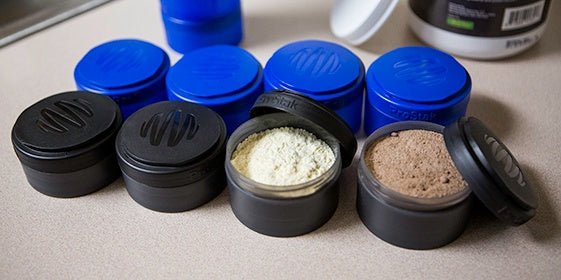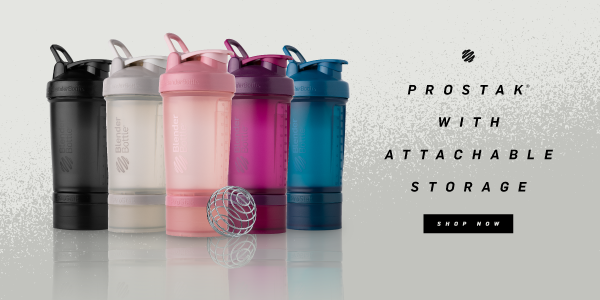If you're interested in sports nutrition, you've probably heard of BCAAs. But you might not have all the info you need as to BCAA benefits, uses, and potential side effects. You may even be asking, "What are BCAAs, anyway?" Let's dig in and learn what BCAAs are all about.
What Are BCAAs?
BCAAs is an acronym for branched-chain amino acids, a group of essential amino acids that includes valine, leucine, and isoleucine.
The next logical question is: "What are amino acids?" Amino acids are the building blocks of protein, which is critical for our bodies' structure, strength, and function. There are two types of amino acids: essential and non-essential. The 13 non-essential amino acids are produced naturally within our bodies; the other 9 essential amino acids must come from our food or supplements. BCAAs differ from other essential amino acids in their branched molecular structure.
BCAA Benefits to Athletes
Athletes primarily use BCAAs to reduce muscle breakdown and enhance recovery. Studies like this one and this one show that BCAAs help promote muscle protein synthesis (aka muscle building) and reduce post-exercise muscle soreness (aka DOMS), when taken before and after intense training. Basically, BCAAs help you recovery faster and more fully so that you can push your body all over again.
Unlike most amino acids, which are processed in the liver, BCAAs are primarily metabolized within muscle tissue. This means they are quickly absorbed, plus they provide an additional fuel source for working muscle. BCAAs have been shown to help retain muscle mass and maximize fat loss while on a calorie restricted diet–which is especially appealing to bodybuilders looking to lean down while staying ripped.
BCAA benefits to athletes are considered significant. Athletes primarily use BCAA powder or supplements to reduce muscle breakdown and enhance recovery. Studies like this one and this one show that BCAAs help promote muscle protein synthesis (aka muscle building) and reduce post-exercise muscle soreness (aka DOMS), when taken before and after intense training. Basically, BCAAs help athletes recover faster and more fully so that they can push their bodies to perform again and again.
Unlike most amino acids, which are processed in the liver, BCAAs are primarily metabolized within muscle tissue. This means they are quickly absorbed, plus they provide an additional fuel source for working muscle. BCAAs have been shown to help retain muscle mass and maximize fat loss while on a calorie restricted diet, which is especially appealing to bodybuilders looking to lean down while staying ripped.
Another interesting BCAA benefit is delayed fatigue during prolonged exercise, allowing athletes to work harder, longer. This study shows that BCAAs may help maintain mental focus and alertness by blocking tryptophan from crossing the blood-brain barrier a process that normally increases during extended exercise, and is followed by serotonin production, which in turn causes fatigue. In addition to the recovery benefits of BCAAs, that improved mental edge which is critical during strategic, grueling, long-distance events is why BCAAs are widely used among endurance athletes like ultrarunners and long-distance triathletes.
BCAAs are also sometimes attributed with a direct increase in athletic performance. Research results in this area are inconsistent, however, and more evidence is needed to determine whether or not BCAA benefits include a clear performance boost. But direct effect or not, the prospect of improved recovery and reduced muscle soreness is certainly beneficial to anyone wanting to work out on back-to-back days.
How BCAAs Stimulate Muscle Protein Synthesis and Contribute to Muscle Growth
BCAAs (branched-chain amino acids) are critical in promoting muscle recovery and growth. Among the three BCAAs—valine, leucine, and isoleucine—leucine plays the most significant role in stimulating muscle protein synthesis (MPS), the process that helps build and repair muscle tissue.
Leucine activates a key signaling pathway known as the mTOR (mechanistic target of rapamycin) pathway, which is the central regulator of cell growth, including muscle cells. When leucine is present in sufficient amounts, it binds to specific receptors on muscle cells, signaling the mTOR pathway to increase protein synthesis. This leads to an increase in muscle mass over time, especially when combined with resistance training or intense physical activity.
In other words, leucine acts as a "trigger" to turn on the process of muscle building, ensuring that the body has the resources to repair and grow muscle fibers after they’ve been stressed during exercise. Without adequate leucine, the body would struggle to fully activate this important muscle-building mechanism.
Furthermore, research suggests that consuming BCAAs, particularly leucine, after a workout ensures that the body shifts from a catabolic (muscle breakdown) state to an anabolic (muscle building) state, accelerating recovery and muscle growth.
This makes leucine especially valuable for athletes, bodybuilders, and those engaging in high-intensity training, as it helps to maximize the benefits of their workouts by promoting muscle repair and growth.
BCAAs for Women
There are no gender-specific characteristics to BCAAs, which means that BCAAs for women and BCAAs for men are equally effective. BCAA use during pregnancy or while breastfeeding is generally discouraged, however. Not enough studies have been performed to determine conclusively whether or not BCAAs are safe in these instances, or in what volumes.
Other BCAA Uses
This recent report shows that BCAAs can boost the immune system and potentially have a positive impact on gut health, both of which are beneficial to athletes and non-athletes alike. Outside of sport, some people also use BCAAs as a supplement to prevent fatigue and enhance concentration.
Additionally, BCAAs are used in medical treatments for numerous disorders such as brain conditions due to liver disease, various movement disorders, a genetic disease called McArdle's disease, and anorexia. BCAAs are also used to help slow muscle wasting in people who are confined to bed, and to treat poor appetite in patients with kidney failure and cancer.
BCAA Side Effects
For the most part, BCAAs are harmless, and most experts suggest that habitual (daily) supplementation increases their effectiveness. However, as with anything, you can have too much, and that excessive use often leads to potential negative side effects. BCAA side effects can include fatigue, loss of coordination, nausea, headaches, and increased insulin resistance (which can lead to Type 2 diabetes). BCAAs side effects may affect blood sugar levels, so anyone having surgery should avoid them for a period of time before and after surgery. To avoid and mitigate side effects, it's always recommended to be mindful of proper dosage and avoid taking too much. Always follow the recommended dosage amount found on the packaging, or recieve a recommendation from a doctor or other medical professional to know how much is right for you.
BCAAs are also contraindicated for people with certain conditions. Although BCAAs were once thought to be helpful in the treatment of Lou Gehrig's disease (ALS), they are now considered problematic for people with this disease. People with a condition called branched-chain keto-aciduria (or Maple Syrup Urine Disease), kidney disease, liver disease, heart disease, and people who drink alcohol in excess should also avoid BCAA supplementation. If you're unsure if BCAAs are right for you, it's always a good idea to consult with a doctor or medical professional before taking a new supplement.
Where to Find BCAAs & When to Take Them
As essential amino acids, our bodies do not produce BCAAs naturally. Therefore, we need to get BCAAs from our diets. Most people get plenty of these essential amino acids from eating protein-rich foods such as lean meat, poultry, fish, eggs, Greek yogurt, brown rice, quinoa, chickpeas, pumpkin seeds, and a variety of nuts. But for those on restrictive diets who don't eat enough protein (and subsequently don't consume enough BCAAs) from natural whole food sources, supplementation is important. Supplementation is also popular among athletes, for the numerous reasons outlined above.
The volume of BCAAs you consume and when you take them will vary depending on your dietary protein intake, body size, health factors, exercise regimen, and goals. Most people who supplement take anywhere from 4-20g throughout the day, in the form of powders, capsules, or pills. BCAAs can be taken at any time before, during, or after exercise, as well as throughout the day.
Ultimately, when considering any supplementation or significant dietary changes, we think it's wise to consult a doctor or a registered dietician to determine what makes sense for your personal health and wellness.
FAQs
Are BCAAs good for you?
Yes, BCAAs are good for you. In fact, they're critically important. They are a group of essential amino acids, which your body needs to function properly. BCAA benefits to athletes include improving recovery and enhancing mental alertness during prolonged activity.
Is taking BCAAs safe?
For the most part, BCAAs are safe, and daily intake is believed to increase their effectiveness. BCAA side effects are uncommon, and usually related to excess use. These potential overuse side effects include fatigue, loss of coordination, nausea, headaches, and increased insulin resistance.
What is BCAA? What do BCAAs do?
BCAA is an acronym for branched-chain amino acid. BCAAs are a group of essential amino acids that includes valine, leucine, and isoleucine. Amino acids are the building blocks of protein, which is critical for your body's structure, strength, and function.
When should you drink your BCAAs?
Opinions vary. Many people believe that BCAAs are most effective when taken immediately pre-workout (to help with mental acuity during a long session), post-workout (to speed recovery), or before bed (to allow for improved muscle recovery when at rest). BCAAs may be taken at any time, so the choice is yours to determine what works best for you.
Do BCAAs help you lose weight?
BCAAs have been shown to help retain muscle mass and maximize fat loss in conjunction with a calorie-restricted diet.
Can BCAAs cause hair loss?
Hair loss can point to amino acid deficiencies (as well as iron and vitamin deficiencies), so actually the opposite is true. BCAA benefits include serving as protein building blocks for healthy hair.
Is it OK to take BCAAs before bed?
BCAAs can be taken at any time before, during, or after exercise, as well as throughout the day and before bed. Many people believe that taking BCAAs at bedtime can help with overnight muscle-protein synthesis.
We hope you found this rundown of BCAA benefits, uses, and potential BCAA side effects helpful. What are some other health and nutrition topics you'd like to learn about here?



Leave a comment
All comments are moderated before being published.
This site is protected by hCaptcha and the hCaptcha Privacy Policy and Terms of Service apply.